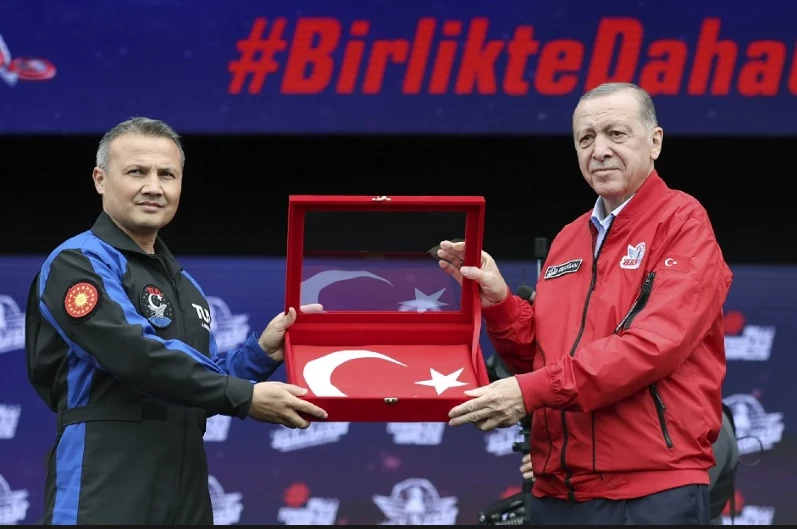Turkey's first astronaut brandishes Erdogan's ambitions

Stay tuned with 24 News HD Android App

When Turkey's first astronaut blasts off for the International Space Station (ISS) this week, he will embody his country's pride and President Recep Tayyip Erdogan's outsized geopolitical ambitions.
Alper Gezeravci, a 43-year-old fighter pilot and colonel in Turkey's air force, is due to take off on Wednesday from the Cape Canaveral Space Force Station in Florida for a two-week mission.
He will be joining Swedish, Italian and Spanish astronauts aboard a shuttle provided by the private Axiom Space company, which will be conducting its third flight under a partnership with NASA.
Erdogan has displayed a keen interest in the mission, which comes against the backdrop of a raging economic crisis and signs -- despite his best efforts -- of the Turkish leader's limited influence on world events, including the wars in Gaza and Ukraine.
Erdogan presented Gezeravci to the Turkish public in the runup to his re-election last year, calling the 21-year air force veteran a "heroic Turkish pilot".
"We see it as a new symbol of the growing, stronger and assertive Turkey," Erdogan said about the space mission on Tuesday.
Marc Pierini, a former diplomat and senior researcher at Carnegie Europe, said Gezeravci's flight illustrates "Turkish excellence in the aerospace field", which includes the creation of a world-leading combat drone company.
But, Pierini added, it says little about Turkey's role in world affairs.
"It doesn't have anything to do with Turkey's ability to be an actor that could influence the global political agenda," Pierini said.
"Fluctuations in Turkey's foreign policies do not create hope for Ankara to have a leading role on the international scene."
In the run-up to last year's election, Erdogan prided himself on helping secure a grain deal that lifted Russia's naval blockade of Ukraine -- the only major agreement signed by the sides since the Kremlin's February 2022 invasion of its neighbour.
That deal has since collapsed and Erdogan's attempts to restart peace talks between Moscow and Kyiv -- or halt the Israel-Hamas war -- have fallen flat.
In the meantime, Turkey has drawn the ire or its Western allies by stalling the approval of Sweden as a member of NATO, continuing to maintain close business ties with Russia, and branding Israel a "terrorist state".
- 'Turkey's turn'-
Despite its economic and foreign policy challenges, Turkey has been leading an ambitious aerospace programme.
"This historic event will not only validate technological objectives and galvanise the national pride of the Turkish people, but also launch a new era of scientific innovation and international collaboration," said Halit Mirahmetoglu, general manager at the Gokmen Space and Aviation Training Centre in northwestern province of Bursa.
"The aviation, space, defence and software industries are interconnected and mutually reinforcing," Mirahmetoglu said, pointing to the Baykar company, a drone maker headed by Erdogan's son-in-law.
"The field of space exploration, long reserved for a club of developed nations, is now opening up to emerging countries," Mirahmetoglu said.
"It is Turkey's turn to join the big club."
Gezeravci, for one, appears to be aware of the symbolic importance of his mission, saying he is ready to "take the dreams of the Turkish people into the depths of space".
"This trip is not an end for us but a means for achieving the objectives of our space studies," he said in an interview with the official Anadolu news agency.
According to NASA, the ISS has welcomed more than 275 astronauts on board, with missions tending to last several months.
